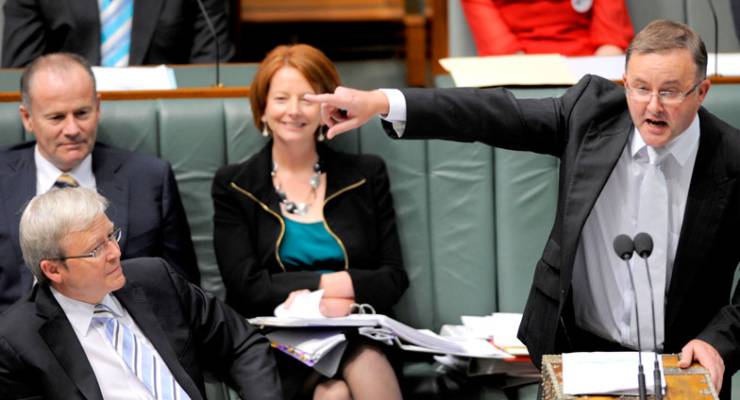
The Rudd government frontbench, circa 2009
There was really only one person who could launch the book The Killing Season Uncut by the ABC’s Sarah Ferguson and Trish Drum: Labor all-rounder Anthony Albanese, in his introductory speech, outed himself as the only person who still spoke to both Julia Gillard and Kevin Rudd.
The shadow spokesman for transport and infrastructure told the crowd that he had remained good friends with the two ex-PMs and he didn’t think “there was another person who could say that”. Given the subject matter of the book, and the television series on which it is based — the bitter, career-ending war between the two — he is probably right.
He said that the series was “entertaining and riveting for the players and viewers — there was no one in the corridors of power when it was on”.
Governing with the hung Parliament from 2010 to 2013 was very challenging, he said. He said he had told Christopher Pyne, the leader of the House, “if you’d had 70 seats instead of 90, you wouldn’t have made it to question time on day one”.
However, Albo said he thought the book “emphasised the political intrigue of the hung parliament, rather than focus on what it achieved”; his personal involvement with transport legal reform, reducing the number of transport regulators from 23 to three and saving the country $30 billion, was a curious omission, he said.
Showing series like The Killing Season was proof of the importance of having a national broadcaster, he added, to an audience that included outgoing managing director Mark Scott and chairman Jim Spigelman.
“The ABC stands out as an institution which makes a difference,” he said, singling out journalists Adele Ferguson and Marian Wilkinson (who were both present) for their work on the financial sector.
“The ABC and SBS deserve a cherished place in this country and deserve our support at this time.”
Sarah Ferguson, in a fantastic, fire-engine red Victoria Beckham dress, said that she had told potential interviewees of the series that the narrative would belong to those who showed up.
In the book, Ferguson and Drum write:
“We’d accepted there could be no definite truth, only the subjective experiences of each of the players. In Gillard’s version, she was left with no choice but to act in the best interests of the nation. In the same way, Rudd tried to reduce the events of 2010 to a single base instinct: Gillard’s overweening ambition.”
At the launch, Ferguson says she wrote the book because it gave her a chance “to go back and look at and reflect on the material which was not in the series, and look at my own methods and analyse the art of political reporting”.
“There could never of course be a single truth but being able to go back and re-examine the political reporting was an enormous privilege for me.”
As she moved between the two sides, “(good Kevin/bad Kevin, patient Julia/ruthless Julia). my certainties moved too. At the time I thought I would lose my mind in no-man’s land. I longed for a story with a single villain whom I could pursue to the ends of the Earth.”
The book has great storytelling detail, including the fact that the series, which has a fast-paced editing style, contains more than 1200 shots in each episode, which is more than most feature films. However, the pace was slowed down for a pivotal interview with former Treasury secretary Ken Henry. Ferguson says that filming of this went on for so long that Henry began worrying about his dogs, alone and unfed at home. The book also contains an excellent running joke about Ferguson accidentally barging in on Wayne Swan in his underwear: “He was much cooler about it than I was.”
Ferguson says that the series was always intended as a drama, owing more to Netflix than a parliamentary broadcast, but its plot points were the policy battles of the Labor government. The book gives a fascinating insight into how hard it was to get most of them on camera, especially Rudd. You discover that for the serial interviewees, both the talent and Ferguson had to wear the same jackets for the sake of continuity. After the first, difficult interview with Rudd, the production team held onto his jacket “as a hostage” to ensure a second go.
There’s also a great story about Ferguson sitting down in a Sydney bar with Rudd to go over the material for the upcoming interview.
“Rudd leaned forward and whispered in French, ‘the man behind is listening to our conversation. Let’s move’,” she writes.
It was an excellent launch, and the crowd included Greg Combet (famous for being the sweariest interviewee) and his partner, Juanita Phillips, Rudd’s former media adviser Lachlan Harris, Andrew Denton and Jennifer Byrne, Mike Carlton and Morag Ramsay, and a host of people from the ABC. Also in attendance were Ferguson family friends (and dual Oscar winners) Mad Max:Fury Road director George Miller and his wife, film editor Margaret Sixel.
One of the most interesting stories in the book concerns the newspaper article that provided the trigger for Gillard to move against Rudd. On Wednesday, June 23, 2010, Peter Hartcher and Phillip Coorey wrote in The Sydney Morning Herald that Rudd’s chief of staff, Alister Jordan, had been talking privately to almost half the caucus to gauge whether Rudd had the support of his party.
Gillard saw this story as evidence that her leader had lost faith in her, and now distrusted her.
Ferguson writes in the book that “we checked the claims reported in the story, for the series and for this book. We contacted Rudd’s Cabinet, members of the outer ministry and a large number of backbenchers. Only two out of 72 Caucus members we contacted described having a conversation with Jordan” of this type. Fifteen of the 18-member cabinet said they had not been sounded out; three declined to answer.
Gillard challenged that night and was sworn in as the first female PM the next day. At the time, Albo was quoted as saying, “if this occurs, we will kill two Labor prime ministers … this was the original sin which once committed would be a stain on the Labor Party which couldn’t be removed by one week or [a] couple of months to the election campaign”.
It turns out, of course, that Albo was right. On July 2, we will find out if the Coalition has followed suit.








Kevin Rudd and Sarah Ferguson went to a Sydney bar for a chat and expected nobody would eavesdrop?
It seems reasonable, form1planet, that they assumed everyone knew not to take seriously ANYTHING their mob said outside the various Power Brokers Back Rooms.
Until Ferguson does another series…TV and book… on the Coalition knifing last year, she has NO credibility at all.
Especially as she has seen fit to launch this book in the middle of an election campaign. Obviously to do maximum damage to the Labor Party. Well I’ve got news for you, Sarah…I wouldn’t read this book if it were the last one ever published!
BIAS, BIAS, BIAS anyone????
“Sarah Ferguson …… said that she had told potential interviewees of the series that the narrative would belong to those who showed up.”
Blackmail?
Facts are irrelevant?
“A pox on both their houses” would seem to apply.
I thought the Killling Season was disappointingly superficial, focussing, as so much journalism does, on politics as sport and not looking at the policy and decision-making reasons behind what happened or the actual dynamics of running a Government,and whether this could have been done differently or better. It was about who said what to who and who was knifing who in the back, and very little of the why and what lessons could be learnt